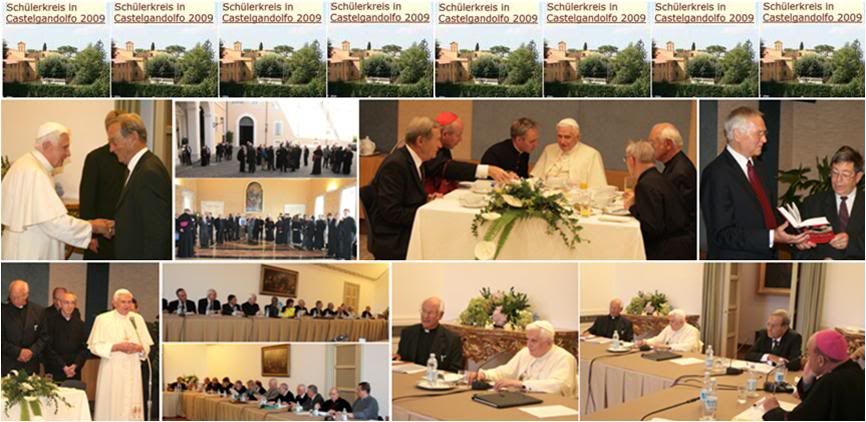

 Topic for 2010 Schuelerkreis seminar:
Topic for 2010 Schuelerkreis seminar:
Vatican II as renewal in continuity
by Paolo D’Andrea
Adapted and translated from

June 18, 2010
Secolo d'Italia is the newspaper of Silvio Berlusconi's political party, Popolo della Liberta.
On the last weekend of August, Pope Benedict XVI will open the doors of his summer residence in Castel Gandolfo for the sixth year running to his former doctoral students in theology for their annual reunion seminar.
The focus of their discussion this year will be the interpretation of Vatican II, which has been the center of a cultural-theological war since the Council ended in 1965.
The resource person who will deliver the central lecture is the Bishop of Basel (Switzerland), Mons. Kurt Koch, who is expected to be named on July 1 as the new President of the Council for Promoting Christian Unity, succeeding Cardinal Walter Kasper, who is retiring at age 75.
Former Professor Joseph Ratzinger has been holding these annual seminars with his students, known informally as the Ratzinger Schuelerkreis, since 1977.
For the Pope, it is a time of intimacy and informality, a chance to step back into the role of professor-scholar, surrounded by his friends, as they discuss subjects of cultural and theological relevance.
Some 40 of his ex-students, whom he guided through their doctoral dissertations in theology in Bonn, Muenster, Tuebingen and Regensburg, usually attend these seminars. Two years ago, the Schuelerkreis started inviting younger students of Ratzinger's theology to attend the meetings.
This year, the topic is something that has been prominent in this Pontificate. The Bavarian Pope has been presented by opposing camps as someone who has 'ditched' the letter and intent of Vatican II, or as the providential 'whip' seeking to correct all the errors resulting from the wrong reading of the Council.
The young Ratzinger, who was considered the 'enfant prodige' of German theology in the early 1960s, was initially part of the group of reformist theologians in the Second Vatican Council. As the theology consultant for Cardinal Joseph Frings of Cologne, he was responsible for many of Frings's explosive interventions in the Council. Frings, from the beginning, openly opposed the attempted 'domestication' of the Council agenda by the Roman Curia.
Along with other prominent theologians of the day like Rahner and Congar, Kueng and Danielou, Schillebeeckx and Haring, Ratzinger took part in strategy sessions held by the reformist French and German bishops who influenced the input of the Council fathers from central Europe.
But even then, he avoided extremist positions. The model he always followed was a return to the teachings of the Fathers of the Church and to the earliest sources of the faith [
ressourcement], with a simplification that would liberate the Church of the incrustations of time and show her authentic and attractive 'face'.
With constant fidelity to this objective, almost immediately after the Council, Ratzinger began to develop his own critical examination of the roads embarked upon by some of the theologians who were once his colleagues but who now espoused a 'new' post-Conciliar Church.
He felt they embodied a paradoxical 'triumphalism' in claiming to ride the spirit of the times. For example, as early as 1966, in a Hamburg lecture, he expressed his uneasiness at what he considered 'bustling about for the sake of bustle' of those who were preparing to reform the liturgy.
In his first year as Pope, Benedict XVI fully laid out his thinking on the interpretation of Vatican II in his now famous pre-Christmas address to the Roman Curia.
He openly contrasted the misleading hermeneutic of rupture or discontinuity (which postulates a pre-conciliar Church and a post-Conciliar one as different and irreconcilable realities), with the patient but fruitful 'hermeneutic of reform', which allows for renewal in continuity, recognizing that "only principles express the lasting essence", whereas "concrete aspects are not all equally lasting since they depend on the historical situation and can therefore be subject to change".
That address has been used by those who see Vatican II as a Pandora's box that loosed all kinds of evil and caused the weakness that has afflicted the Church in the past four decades.
Meanwhile, it seems like the most strident supporters of the 'hermeneutic of discontinuity' are turning out to be detractors of Vatican II. They claim that the Council Fathers really intended to give birth to a 'new Church', that would 'yield' to the conditions and demands of the contemporary world - and for this, they cite the Vatican-II documents on ecumenism, religious freedom and inter-religious dialog.
But the Pope himself in the December 2006 discourse to the Curia, addressed such 'fixations', noting that some cases of confrontation with the modern world served to rediscover some traditional features of the Church's relationship to the world.
"Vatican II," he said, "with its redefinition of the relationship between the faith and some essential elements of modern thought, has led the Church to re-think or even correct some historical decisions, but in this apparent discontinuity, she has maintained and deepened her own intimate nature and her true identity".
For all this, to seek to make Joseph Ratzinger look like he has 'rejected' or 'repented of' Vatican II is nothing but a fallacious operation.
In 1992, Vatican correspondent Lucio Brunelli asked Cardinal Ratzinger directly if he thought, as others were suggesting, that the time had come for a Vatican-III in order to 'correct' the doctrinal and disciplinary shortcomings of Vatican II.
The Cardinal's response was immediate and unequivocal: "Per carita!" [Italian expression to say, "Please! You can't be serious!"]
Photos of the 2009 Castel Gandolfo seminar
from the website of the Joseph Ratzinger-Benedikt XVI Stiftung:

[Modificato da TERESA BENEDETTA 19/06/2010 14:31]